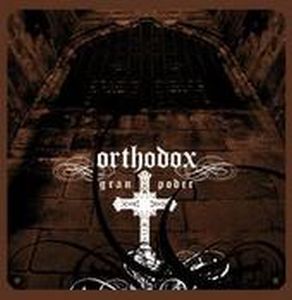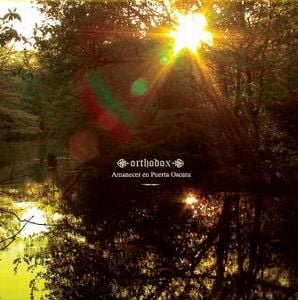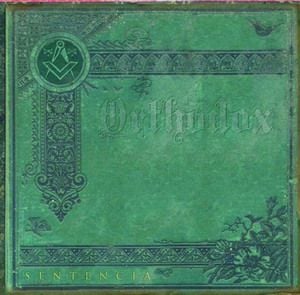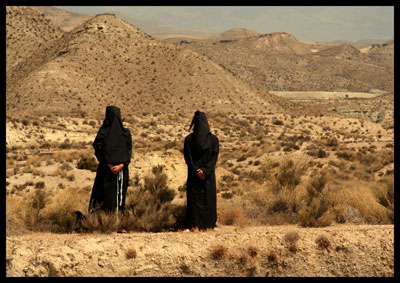Orthodox (August 2010)
Printed From: Progarchives.com
Category: Progressive Music Lounges
Forum Name: Interviews
Forum Description: Original interviews with Prog artists (which are exclusive to Prog Archives)
URL: http://www.progarchives.com/forum/forum_posts.asp?TID=69926
Printed Date: July 02 2025 at 22:59
Software Version: Web Wiz Forums 11.01 - http://www.webwizforums.com
Topic: Orthodox (August 2010)
Posted By: toroddfuglesteg
Subject: Orthodox (August 2010)
Date Posted: August 03 2010 at 15:04
|
There is very few bands in ProgArchives so eclectic as this band from Spain. Still, they are very much a band who deserves more recognition here in ProgArchives. I got in touch with them and their drummer Borja Díaz Vera answered my questions. @@@@@@@@@@@@@@@@@@@@@@@@@@@
When was Orthodox
formed and do you have any background from other bands ?
Marco
(bass and vocals) and Ricardo (guitar) played in a band called
Degüello from Sevilla; they have also been playing in other local
bands like Tierra or The Forge, amongst others, since the `90’s. I
played in some local bands in my hometown, Jerez. We met
the three of us at the end of 2004
and saw that we shared some common musical interests. We started to
play and saw that we can make some interesting things. At the
beginning our goal was to make some heavy stuff without
any
compromises about what metal should be; we wanted to keep things true
and epic, but also with an experimental approach that’s present on
the artists we enjoy and that was absent on the bands that surrounded
us.
Whose
bands were you influenced by?
Black
Sabbath, Rush, Sleep,
Metallica, Manowar, Earth, Judas Priest, Morbid Angel, Burzum, the
Melvins, King Crimson or Mayhem were influential bands for us. But
also visionary spirits like John Coltrane and Ornette Coleman.
To start with;
please give me your (long or brief) thoughts and lowdowns on.........
 Gran
Poder from 2006: A monolithic stab of
primitive force. We had a lot of confidence in that stuff and we
received good response for that album, but I also think that some
people really don’t understand what we were trying to do. Sure it’s
our most minimalist and uniform album, but has a strong experimental
basis that is essential in our sound. And that fact cannot be
overlooked to understand our next recordings.
 Amanecer
en Puerta Oscura from 2007: A hard album in
its gestation; we wanted to go deeper in the experimentation within
the context of heavy songs. It also has minimalism and might, but
expressed in a subtle way. The contrabass is more present, and there
are winds and crazy moments (“Con sangre de quien te ofenda” or
“Templos”) but also some “standard” songs like “Solemne
Triduo”. We wanted to break some borders, especially at a personal
level (for us, it was a non-sense to make a second part of our first
album), but also to reaffirm our personality as a band.
 Sentencia
from 2009: Our third opus. Another twist in
our sound, summing up everything what we’ve done in the past and
putting it on a more menacing manner. The acoustic heaviness and
experimentation is what predominates over
“Sentencia”, sounding like a
rough jazz combo playing under the sun on a desert plain…Recording
this was both a challenge and a risk: a heavy album with almost no
guitar? I think that is a paradoxical recording; perhaps a little
jump in the void, but it was what we have to do at that moment.
You are in the
process of releasing a new '7 EP. Please tell us more about this '7.
It’s
a couple of new songs we recorded last year
(“Matse Avatar” and “YHVH”) with mystic artwork by Elena
Serrato and design by Walrus and Eggman. Packaged and released by
Doomentia Records from Czech Republic (http://www.doomentia.com/).
The songs are working great in our live set and represent a certain
dimension we’re trying to develop for our next album.
What
is your other plans for the rest of this year and next year?
We
had a festival here in Spain along with
Cathedral, Groundhogs and some others that was
cancelled. At the beginning of
September we’re spawning our next album, titled “Baal” and we
hope to play the new tunes in some gigs, like the one we have at the
end of that month in Barcelona, where we will share the stage with
Pagan Altar, Count Raven and Warchetype. We will also be playing in
the Israel Galván´s show, a flamenco dancer, by November/December,
with whom we have played extensively these last three years. For the
next year it should be nice to play some more festivals and going for
the fifth, but there’s nothing sure yet.
How
is the writing and creative processes in your band?
It
depends, we have different songs that were made by different
approaches. For the electric tunes usually Marco
or Ricardo brings a bass or guitar riff or a general idea about the
whole song and we try out things: tempos, vocal lines, what works and
what doesn´t, the
structure, etc. A song like “Ascension” was made during a span of
3 years, changing arrangements and shaping the song
even before we recorded “Gran
Poder”. Or “Marcha de la Santa Sangre”, a song written and
structured by Marco, we only have to play it and record it. But
usually there´s always arrangements and final touches to most songs
that were made in the studio.
How
would you describe your music and which bands would you compare your
music with?
I
would describe our music as a continuation of the Tradition, the Path
that our ancestors took: the creativity. That’s
our formula: to make our own mistakes, not others’. I don’t
bother to compare our music with anyones’, that’s the work of
critics and fans.
Your band name,
image and music is rooted in the orthodox Catholic tradition as the
same time as you describe your viewpoints as "a pagan view of
Christianity". Please describe your whole philosophy and ethos
to us.
We
belong to a country where there is a strong Christian culture. We do
a pagan approach to the dark values and spirituality of Christianity
because we use them trying to recover its
primeval meanings and praxis. Good and Evil are the same thing, a
continuum that on southern Spain resides on Christ´s, Virgin’s and
Saints imaginery, deities deep rooted in our past. The Saints cult,
pilgrimages and other realities we live here are Christian
interpretations of a polytheistic past.
Organized religion had to borrow popular beliefs (amongst other and
different ways to convert pagans and heretics) in order to build its
empire. We are Death and Opression, but also the Atlantic, the
muslims, the Phoenicians and Tartessos amongst many others peoples
are part of our cultural heritage and our lives. You can´t ignore
it.
How
much is religion a part of the Spanish society these days and how do
you express yourself in this environment which back in the 1930s
spawned a civil war?
Religion
understood as an extended hierarchical belief system is very present
in certain strata of Spanish society, but I think its influence is
diluted in its effect. Its shadow cannot be avoided of course, but
it’s not as strong as it used to be in the times of the civil war
and, especially, in the postwar period. Personally I don’t agree
with imposed paradigms and the impact it has in your truly self, but
I don’t have problems with someone who has sincere beliefs. But
these are a minority; most “religious” or “spiritual” people
are totally focused on and enslaved by what they are supposed
to be against to.
I
see you have worked with the well reputed Southern Lord record label.
But how easy/difficult is it to market your music and get any
recognition from the scene?
To
market music is the job of labels, like Southern Lord or Alone
Records. They specialize on a certain market sector; it can be a very
specific one like “ultra-speed-songs-about-killing-your-relatives”
or a more heterogeneous one, or a mixture. Working with independent
labels its not difficult for a band like us and for them it´s the
same, since they work with specialized products like us; it would be
different if we’re talking about majors. In the `60’s and `70’s
any band, even the smaller and darker one, had a major contract. It
means a budget and some perspective for the future, and you had to
sell albums and work also on a promotional level. A label like Ipecac
should not have many problems marketing the Melvins albums, I suppose
Atlantic had certain difficulties to sell “Stoner Witch” or the
“Stag” album. It depends a lot of the zeitgeist of the times you
have to live. The `90’s are not the `70’s, nor the 2000’s.
Being in a independent label makes you freely about some aspects,
specially the artistic ones, but it also limits you about what can
you do and what not with you music. About getting recognition from
the scene, labels had a lot to do to canalize your efforts, but if
you have nothing to offer it’s useless what they do for you (or
what are you doing for them). If we want recognition from any scene,
it’s from the strong individual ones that follow their paths beyond
musical tags or what the market dictates. Pure expression and form
belongs to the ones that have ears and use them reacting, not staying
comfortably numb.
What is your daytime
jobs and how do you manage to find money to continue your band ?
We
all have or had partial jobs and studies that we combine with the
music. In order to get money to continue the band you must stay
focused and trying to know where you are and where you want to go (or
where you weren’t). This
means that we try not to get ripped
off playing nonsensical gigs, or playing for playing just for the
sake of it. I mean, we all love to play and make music, but we all
have responsibilities and we don’t travel 6-8 hours to play for
free. Instead of that, we prefer to develop our sound and musical
ideas and concepts. If a gig it’s ok for us, sure we´re going to
play; if it’s not, we’re using our time and money to keep the
torch alive and not finishing burnt of each other!
Just
to wrap up this interview, what is your five favourite albums of all
time?
Personally:
Anything you want to
add to this interview ?
Thank
you for your time and interest in the band
and in our
vision, continue supporting music and stay tuned for our next
offering “Baal”. Thank you to Borja for this interview. The Orthodox PA profile is http://www.progarchives.com/artist.asp?id=4496 - & their homepage is http://www.myspace.com/orthodoxband -
|
